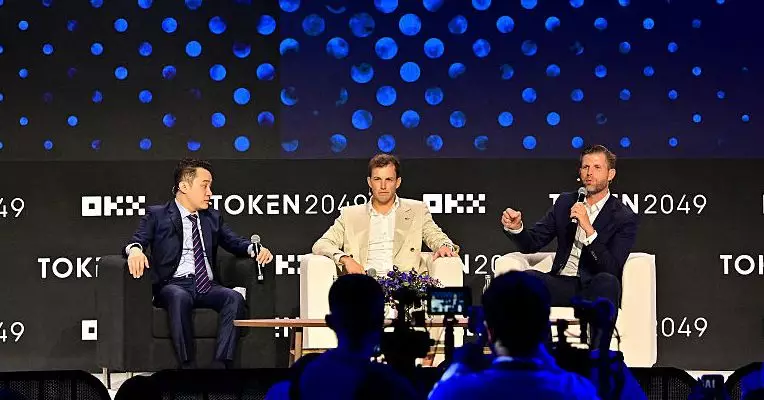The advent of cryptocurrencies has opened a Pandora’s box of financial opportunities and ethical debates, particularly when intertwined with the political landscape. A prime example of this intersection is World Liberty Financial, a crypto enterprise with familial connections to former U.S. President Donald Trump. As the organization seeks to broaden its influence globally, a chorus of critics warns of the potential conflicts of interest that shadow these ventures. The recent appearance of Eric Trump at the Token2049 conference in Dubai, where he revealed significant partnerships, has amplified these concerns.
Token2049: A Stage for Controversy
During the Token2049 conference, Eric Trump and Zachary Witkoff, cofounder of World Liberty Financial and son of a White House envoy, made headlines by announcing that their newly minted stablecoin, USD1, would facilitate a monumental $2 billion investment in Binance—currently the most prominent cryptocurrency exchange in existence. While the partnership with MGX, a UAE-backed investment firm, promises lucrative returns for World Liberty Financial through fees and commissions, it also raises a critical question: Is this a business venture or a veiled opportunity for influence peddling?
At the core of the issue is the stablecoin model itself—the USD1 is pegged to the U.S. dollar, backed by reserves that allow for potential profitability. If the transaction yields $85 million in annual interest by investing in U.S. Treasuries, as estimates suggest, it offers staggering financial incentives for the Trump family, raising eyebrows among pundits and critics alike.
Behind the Cryptocurrency Buzz
The world of cryptocurrencies operates on complex principles, particularly concerning stablecoins such as USD1, designed to maintain a steady value by being tethered to a stable asset—here, the U.S. dollar. This financial model fosters trust among investors since stability is expected; even in a volatile market, these coins theoretically allow users to redeem them for the assets they represent. With World Liberty Financial handling the exchange, the transaction’s implications become twofold: it could reinforce Trump’s business acumen while simultaneously undermining the integrity of his political standing.
The partnership with MGX, backed by significant foreign investment, further exacerbates these concerns. By involving entities aligned with external interests, critics argue that such arrangements infringe upon ethical business practices, allowing goodwill and favor to be bought, potentially with the tacit approval of the sitting U.S. administration. The ramifications of mixing politics with financial enterprises run deep, as the principle of fair play and transparency is jeopardized amidst the allure of profits.
Ethical Quagmire: Weighing Profit Against Principles
The transaction details have not gone unnoticed in policy circles. Experts, such as George Selgin from the Cato Institute, have labeled the dealings as suspiciously reminiscent of influence peddling, characterized by an alarming lack of transparency. The foundation of democracy rests on the integrity of its leaders, and when such figures are implicated in potential ethical dilemmas, public trust teeters precariously.
The implications extend beyond just the Trump family; they highlight the broader discourse surrounding cryptocurrency’s legitimacy and its operational paradigm. If such dealings are left unchecked, they may set a dangerous precedent, marrying business ventures with political maneuvering.
The Cryptocurrency Landscape: A Call for Reform
As the cryptocurrency landscape continues to evolve, it becomes increasingly apparent that reforms are necessary to ensure accountability. This is not merely a financial issue; it’s a matter of political integrity, requiring transparent governance to distinguish legitimate business practices from unethical ones. The narrative surrounding World Liberty Financial and the Trump family’s involvement serves as a cautionary tale about the potential hazards of intertwining economic aspirations with political affiliations.
With an eye toward the future, stakeholders in the crypto market, including regulators and industry leaders, must establish frameworks that safeguard against conflicts of interest. These necessities underscore the ongoing battle between ambition and ethics—a sentiment echoed in discussions from grassroots movements to global policy forums.
As the world watches, the stakes could not be higher. Balancing lucrative financial opportunities with the imperative for ethical governance is paramount for ensuring the credibility of both cryptocurrency and its contributors. The unfolding saga of the Trump family’s financial engagements in this emerging sector presents a unique crossroads where innovation must coexist with moral duty.

